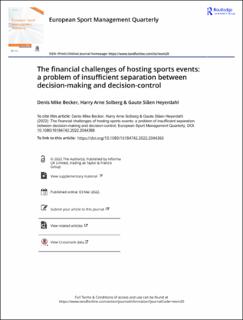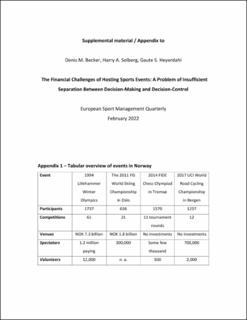| dc.contributor.author | Becker, Denis Mike | |
| dc.contributor.author | Solberg, Harry Arne | |
| dc.contributor.author | Heyerdahl, Gaute Slåen | |
| dc.date.accessioned | 2022-06-30T12:47:27Z | |
| dc.date.available | 2022-06-30T12:47:27Z | |
| dc.date.created | 2022-03-03T12:59:10Z | |
| dc.date.issued | 2022 | |
| dc.identifier.citation | European Sport Management Quarterly. 2022, Artikkel 2044366. | en_US |
| dc.identifier.issn | 1618-4742 | |
| dc.identifier.uri | https://hdl.handle.net/11250/3001796 | |
| dc.description | This is an Open Access article distributed under the terms of the Creative Commons Attribution-NonCommercial-NoDerivatives License (http://creativecommons.org/licenses/by-nc-nd/4.0/), which permits non-commercial re-use, distribution, and reproduction in any medium, provided the original work is properly cited, and is not altered, transformed, or built upon in any way. | en_US |
| dc.description.abstract | Research question: This article aims to explain that poorly functioning separation between decision-making, decision-control, and risk-bearing is a fundamental reason for the financial underperformance of major or large sport events. We look at empirical data from four major sports events hosted in Norway: The 1994 Lillehammer Winter Olympics, the 2011 International Ski Federation (FIS) World Skiing Championship, the 2014 FIDE Chess Olympiad, and the 2017 International Cycling Union (UCI) World Road Cycling Championships. All these events suffered financially.
Research methods: The study data were collected from 66 semi-structured interviews and different types of documents, like guides and reports filed by different stakeholders, applications for financial support, collaboration agreements, protocols of meetings, e-mail correspondence, financial statements, and budgeting documents.
Results and findings: Through an examination of the previous literature, our analysis confirms drivers and symptoms of financial problems at sport events. These are: the exaggerated focus on legitimising the event, soft-budget practices, interference by political interests, and so on. We argue that many of these factors could have been handled better if a more consequent separation of risk-bearing, decision-making, and decision-control was in place.
Implications: We propose a better separation between the decision-making and decision-control function, by means of a permanent and independent entity that is responsible for the decision-control function. Such an institution could enhance knowledge transfer, contribute competence and skills, and improve the financial outcome of a sports events. | en_US |
| dc.language.iso | eng | en_US |
| dc.relation.uri | https://www.tandfonline.com/doi/full/10.1080/16184742.2022.2044366 | |
| dc.subject | agency problems | en_US |
| dc.subject | agency theory | en_US |
| dc.subject | cost overruns | en_US |
| dc.subject | separation of decision and control | en_US |
| dc.subject | sports events | en_US |
| dc.title | The financial challenges of hosting sports events: A problem of insufficient separation between decision-making and decision-control | en_US |
| dc.type | Peer reviewed | en_US |
| dc.type | Journal article | en_US |
| dc.description.version | publishedVersion | en_US |
| dc.rights.holder | © 2022 The Author(s) | en_US |
| dc.source.pagenumber | 18 | en_US |
| dc.source.journal | European Sport Management Quarterly | en_US |
| dc.identifier.doi | https://doi.org/10.1080/16184742.2022.2044366 | |
| dc.identifier.cristin | 2007343 | |
| dc.description.localcode | Institutt for idrett og samfunnsvitenskap / Department of Sport and Social Sciences | en_US |
| dc.source.articlenumber | 2044366 | en_US |
| cristin.ispublished | true | |
| cristin.fulltext | original | |
| cristin.qualitycode | 2 | |

